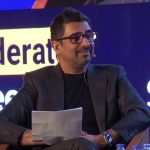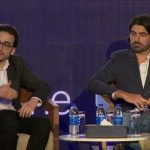From strategic outreach programmes across the region to partnering with global film institutions, the DIFF team has played a significant part in putting Arab cinema on the global map The ninth edition of the Dubai International Film Festival (DIFF), held from December 9-16, 2012, screened 158 films from 60 countries. The festival opened with Academy […]
 From strategic outreach programmes across the region to partnering with global film institutions, the DIFF team has played a significant part in putting Arab cinema on the global map
From strategic outreach programmes across the region to partnering with global film institutions, the DIFF team has played a significant part in putting Arab cinema on the global map
The ninth edition of the Dubai International Film Festival (DIFF), held from December 9-16, 2012, screened 158 films from 60 countries. The festival opened with Academy Award winner, Ang Lees film, Life of Pi. Egyptian actor Mahmoud Abdul Aziz and British director Michael Apted were both recipients of DIFFs prestigious Lifetime Achievement Award this year. Besides bringing together legends of the silver screen, and established and emerging filmmakers, DIFF also served as a training platform for aspiring filmmakers and a market place to buy and sell content. The event hosted more than 25 diverse workshops, forums and industry panel discussions and was an influential platform for professionals to share their knowledge and expertise on various subjects including scriptwriting, acting, marketing, financing and distributing.A special highlight of this edition of DIFF was Broadcasters Day. This series put some of the decision makers in the TV industry in touch with up-and-coming content developers.
As part of our social responsibility programme, BroadcastPro Middle East has offered this space to journalism students of Dubai-based Manipal University. They have summed up some of the panel discussions for our readers.
How to export local content?
This opening session discussed the challenges faced by producers with regards to the distribution of their content, their inability to access space on TV channels to showcase their work and the lack of good platforms to showcase content that is not considered mainstream. Panelists in this session included Peter Einstein from Rotana; Hamida Aman of Guru productions; Bassil Hajjar of Reed MIDEM; Khalid Khouri of twofour54 Ibtkar and Emmanuel Durou of Deloitte Middle East. The discussion was moderated by Vijaya Cherian, Group Editor of CPIs Broadcast Division.
Deloittes Durou took the audience through some of the key trends in the market. We learnt that Egypt, KSA and Morrocco had larger audiences for Arabic cinema while in the UAE, Hollywood blockbusters and Bollywood movies ranked first and second respectively.
Peter Einstein, Deputy CEO of Rotana Media Group pointed out that Rotana has a library of more than 1500 Arabic classics, of which at least 60% had not been taken out of the can in the last 40 years. He explained that efforts were being made to digitise the content for future monetisation.
Documentary maker Hamida Aman, who hails from Afghanistan, rued the lack of interest from broadcasters for independent works and said the Web provided the platform broadcasters refused to give her.
Bassil Hajjar, who represents MIP in the Middle East, encouraged filmmakers to go to Cannes and actively participate in the events to be seen and heard. As someone who has helped in the selling and buying of Arabic content, Hajjar was quick to offer his support to filmmakers looking for a window of opportunity.
Khalid Khouri of twofour54 ibtikar added that the Abu Dhabi entity enabled the production of content through funding, training programmes for local talent and by marketing the finished content in both domestic and international markets.
Everyone seemed to agree that broadcasters needed to look beyond mainstream content and create additional space to screen alternative content.
– Syeda Nawab Fathima















































































